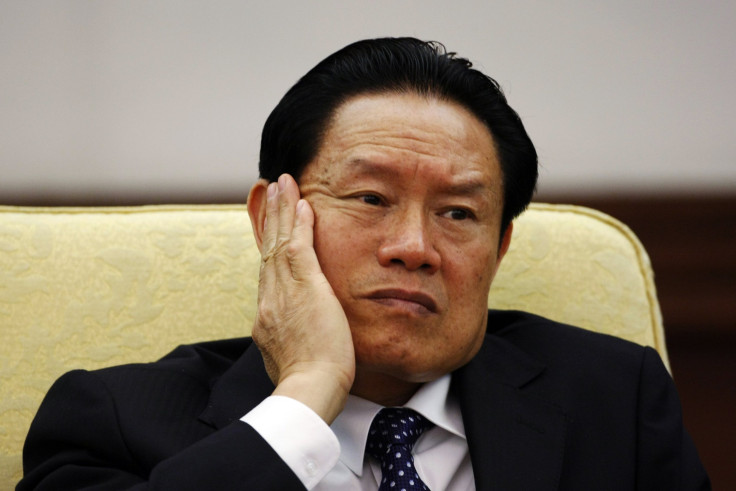Zhou Yongkang, China’s Former Security Chief, Jailed For Life For Taking Bribes, Abusing Power And Leaking Secrets

SHANGHAI -- China’s former security chief Zhou Yongkang has been sentenced to life in prison after being found guilty of taking bribes, abusing his power and disclosing state secrets.
China’s Xinhua news agency said on Thursday that Zhou, formerly the third highest official in the Chinese Communist Party, was convicted of taking bribes worth 130 million yuan (around $21 million), and of abusing his power to help five associates, most of them his former subordinates in China’s oil industry and in Sichuan province, where he previously worked.
He was also found guilty of leaking state secrets, though the report did not give any details of this. Chinese media had earlier said that Zhou, the most senior Chinese official to be put on trial in decades, would receive an “open” trial. However Xinhua said that because the case involved state secrets, the trial had been held behind closed doors, on May 22. It said Zhou had pleaded guilty and did not plan to appeal the verdict.
Zhou, who retired in 2012, is the highest-profile victim of a crackdown on corruption launched by China’s president and Communist party chief Xi Jinping, who took power the same year. His removal from office has been seen by analysts as an attempt by Xi to consolidate his hold on China’s security apparatus.
There has been speculation that Zhou’s downfall could have been linked to that of disgraced former politburo member Bo Xilai, who was jailed for life in 2013, shortly after his wife was found guilty of poisoning British businessman Neil Heywood. Earlier this year, China's Supreme People's Court is reported to have accused Zhou of colluding with Bo to conduct what it called “non-organizational political activities," which some analysts have seen as a reference to unconfirmed rumors that the pair may have tried to stage a coup in March 2012, shortly before Bo’s arrest.
Willy Lam, a specialist on Chinese politics at the Chinese University of Hong Kong, told International Business Times recently that the state secrets charges may have related to rumors that Zhou “illegally taped telephone conversations by China’s top leaders, or may have colluded in the release of information about the wealth of family members of President Xi or of [former Premier] Wen Jiabao. He ran the state security apparatus so he could have done this.” However Lam added that “the full details of the state secrets charges may never be known.”
What is clear is that Zhou was accused of building up a network of patronage during his rise through China’s political system over several decades. Before becoming head of the Communist Party’s Commission for Political and Legal affairs in 2007, he served as China’s police minister, and as party chief of Sichuan province. Much of his career, though, was spent in the state-run oil industry, where he rose over three decades to become head of the China National Petroleum Corporation (CNPC).
Xinhua said Zhou had admitted to “seeking profit” for five people including Jiang Jiemin, a former general manager of CNPC. Jiang has also been charged, and further trials are likely to follow. Xinhua also noted that Zhou’s wife Jia Xiaoye and son Zhou Bin had accepted money and property worth 129 million yuan.
There has been some speculation that Zhou’s decision to plead guilty and accept the court’s verdict may have been part of a plea bargain to ensure that none of his family members received the death sentence.
Last year, China’s Xinhua news agency said that Zhou took bribes “directly and via his family members,” and used his influence to help family members and friends “gain huge profits through business activities.” Among other allegations, Zhou Bin was reported by Chinese media to have bought an oilfield from CNPC for $3.2 million and sold it for over $88 million.
Zhou Yongkang was also accused by Chinese media of seeking to committing adultery with “a number of women,” trading "money and power for sexual advantages,” and helping his mistresses go into business, though these accusations were not referred to in the initial announcement of the verdict.
When the investigation into Zhou was first announced, Xinhua said it would help to put an end to what it called “a myth among many people that senior leaders are regarded to be immune from the party discipline regulation and the country's law enforcement.”
Lam said there was no doubt that Zhou Yongkang was “the most powerful head of China’s state security apparatus ever.” He noted that spending on internal security had exceeded that on China’s army in 2011-2012. “Zhou built a huge empire, he was the ringleader of a gang of around 100 senior officials and members of his family,” he said.
Since Zhou’s downfall, a number of senior officials within the security apparatus have been replaced, and at least one arrested. Xi recently held a rare public meeting with top security officials in which he called on them to guarantee absolutely loyalty to the Communist Party leadership, amid what he called challenging historical conditions.
The petroleum industry has also become a major target of China’s current anti-corruption campaign in the past year, with many senior executives detained.
© Copyright IBTimes 2025. All rights reserved.






















